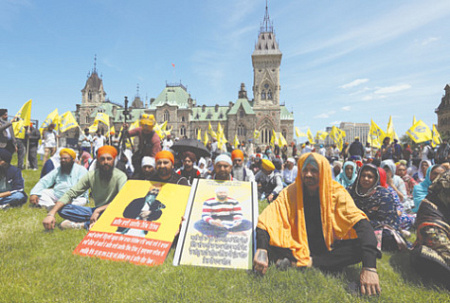
Despite the protests of the Canadian Sikhs, Indian Prime Minister Narendra Modi will take part in the G7 summit, which begins on Monday, June 16. He was personally invited by Canadian Prime Minister Mark Carney, making it clear that he was determined to normalize relations between the two countries. They escalated in 2023, when the Canadian authorities accused the Indian intelligence services of murdering one of the leaders of the Canadian Sikhs. However, even with the community’s resentment, the Carney administration is unlikely to abandon its intention to adhere to pragmatism in its foreign policy, as well as the search for ways to reduce economic dependence on the United States.
Representatives of the Sikh community demonstrated in Ottawa, outraged by Modi’s invitation to the G7 summit. “On a personal level, as well as on a societal level, it was deeply offensive… The lives of Sikhs are not as important as the fifth largest economy in the world, which should be at the negotiating table,” one of the leaders of the religious group quipped. Sikhs mostly live in the Indian state of Punjab, and one of the largest diasporas is located in Canada. About 800,000 Sikhs live in this country. The total population of Canada is about 40 million people.
Historically, the religious group aspired to acquire its own state of Khalistan. This was a problem first for the British administration and then for the national government of India. The deterioration of relations between the Sikhs and the center occurred in the 20th century, after the massacres of followers of this religion in the city of Amritsar, first in 1919, and then in 1984. The Indian army’s storming of the Golden Temple 41 years ago, which led to the deaths of hundreds of people, led to the assassination of Indira Gandhi, who was prime minister at the time. She was shot by her own bodyguards, both Sikhs.
The aggravation of the “Sikh problem” in the context of Canadian-Indian relations resulted from the murder of one of the leaders of the Sikh community in Canada, Hardeep Singh Nijar, on June 18, 2023. The community blamed the Indian Foreign Intelligence Service for this crime. The Canadian government, led by Justin Trudeau, then agreed to the accusations, expelling six Indian diplomats from the country. India denied involvement in the murder. Before Carney’s appointment as prime minister, relations between the two countries were in crisis. The situation was complicated by regular warnings from the Canadian police about the threat to Sikh activists, presumably in connection with the activities of Indian agents.
The decision to invite Modi to the G7 summit is related to Ottawa’s intention to pursue a pragmatic foreign policy, as well as the need to reduce dependence on the United States by strengthening relations with other countries, including in trade. India, which occupies one of the leading positions in the world in terms of the largest economy, is undoubtedly one of the most attractive economic partners for Canada.
According to Indian Foreign Ministry spokesman Randhir Jaiswal, the country is positive about the prospect of restoring contacts with Canada and deepening economic ties with it, seeing this as “a valuable opportunity to exchange views on bilateral and global issues and explore ways to establish or reset relations.” Moreover, a Bloomberg report says that Canada and India plan to share intelligence in order to combat the growing threat of international crime and extremism.
At the same time, Canadian Sikhs perceive Carney’s actions as betrayal. “If a foreign government is trying to kill your political leaders, you might think they won’t be welcome in your country, but it seems Prime Minister Carney thinks otherwise,” Balpreet Singh, a spokesman for the World Federation of Sikhs of Canada, told the Ottawa Citizen newspaper.
Earlier this week, Parliamentarian Sukh Dhaliwal, who represents the constituency where Nijar was killed, also met with the Canadian Prime Minister. This event shows that not only Sikh activists are concerned about Modi’s visit, but also Sikh politicians, who are quite widely represented in government authorities.
Elena Komkova, chief researcher at the Institute of the USA and Canada of the Russian Academy of Sciences, recalled in a comment to NG that the ruling Liberal Party, of which Carney is the leader, can now afford to move closer to India. Parliamentary elections were held on April 28, and the liberals won them, which means they can ignore the opinion of Sikh voters to a certain extent. But what Carney cannot ignore is India’s economic influence and the fact that it, like Canada, is part of the “Commonwealth of Nations” (an association of former colonies and dominions of the British Empire) and is the largest democratic state in the world by population and an important player in the Asia–Pacific region. “Modi’s invitation to the G7 meeting is being criticized in Canada not only by the Sikh community, but also by many parliamentarians and foreign policy experts. But this is Carney’s decision, which is interested in diversifying Canada’s trade and economic ties in the context of the tariff war with the United States. Apparently, the Prime Minister believes that it is necessary to conduct a dialogue, including with “problematic” countries, with those with whom there have been bad relations in recent years. This is necessary so that Canada can act more freely in the international arena and depend less on the United States, at least while Donald Trump is in power there,” Komkova believes.
